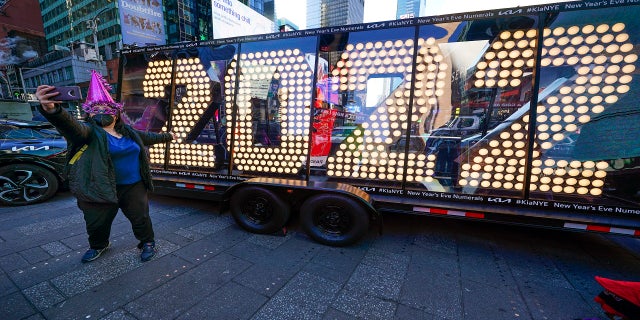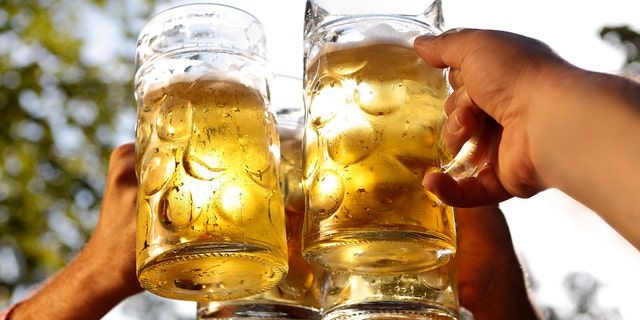On New Year’s Eve, 22 smart reasons not to drink and drive
The New Year of 2022 is practically here. But before all the New Year’s Eve celebrations begin, it’s essential to understand one very key point.
None of us should be getting behind the wheel of a car if we’ve been drinking. That applies not just to this New Year’s Eve, of course, but to any day or night of any year.
Life simply has no rewind option.
7 NEW YEAR’S RESOLUTIONS AND HOW TO CRUSH THEM
Consider this statistic: The National Institute of Alcohol Abuse and Alcoholism reports that 40% of deadly crashes between Christmas and New Year’s involve drunk drivers. On top of that, an average of 54 fatalities occur due to alcohol-related car crashes on New Year’s Eve alone, says the organization, which is part of the National Institutes of Health.
As we look to ’22, let’s dive into 22 smart reasons to avoid drinking and driving on New Year’s Eve. As we do, let’s remind ourselves of all the good things we can focus on as we get ready to turn the page on 2021 and begin 2022.
22 smart reasons not to drink and drive on New Year’s Eve
1. You, your family, your friends, and your community are valuable and worth protecting. If you head into your New Year’s Eve celebrations with this thought top of mind, you’re ahead of the game. Sure, have fun ringing in the New Year — but don’t get behind the wheel of a car during or after that fun if you’ve been drinking. The risk is too great of hurting yourself, your loved ones, other people near and dear to you, or anyone, for that matter.
2. Know that you can build better memories on New Year’s Eve (and any time) without alcohol. (Yes you can!) Choose a glass of seltzer with a twist of lime or a splash of cranberry, or some other refreshing non-alcoholic drink. Don’t let others try to convince you that you can only have fun if you’re downing beer, wine, Champagne, or something far stronger than that. To put it another way: If you’re driving on New Year’s Eve, skip the alcohol.
3. Keep the kids in mind. Impressionable eyes often watch your actions closely. And for others in your orbit who may also look up to you — friends, colleagues, neighbors — the simple act of calling an Uber or Lyft for yourself or someone else who has been drinking may be the perfect example to set, now and always.

A woman poses for a selfie in front of a 2022 sign displayed in Times Square, New York City, on Monday of this week. On New Year’s Eve (and every day and night of the year), none of us should even think of getting behind the wheel of a car or truck if we’ve been drinking.
(AP/Seth Wenig)
4. Know that there is wisdom, including the spiritual kind, in making the right choices in life, including this one. You do not want “the potential of being arrested, fined, losing your license, or living with the knowledge that you either permanently disabled or killed someone because of your choice,” Bob Wendt, director of Abundant Honor Ministries in Harleysville, Pa., told Fox News Digital. “Choose wisely.”
5. Remember your health matters over the long haul. “The majority of trauma patients coming to the emergency department involve alcohol use by the patient or the person who hit the patient,” Lenard Kerr of MercyOne in Des Moines, Iowa, told Fox News Digital. Plus, he said, “Having a criminal record and the PTSD of injuring someone while intoxicated stays with you for a lifetime.”
6. Think of the blue. Law enforcement officers have a tough job as it is. As a member of the Flemington Borough Police Department in Flemington, N.J., told Fox News Digital, “Think about the officer having to notify your family or the family member of another that [a loved one has] been badly injured or killed in a motor vehicle accident involving a drunk driver.” He added succinctly, “Be smart. Don’t drink and drive.”
7. If all of the above points still haven’t made an impression — then think dollar signs. Between attorneys’ fees, fines, lost wages, and other expenses, a single DUI conviction can reportedly cost a driver an average of $4,100. With inflation hitting Americans hard this year, an unexpected expense like that would be a really lousy way to kick off 2022.
SAN FRANCISCO CANCELS NEW YEAR’S EVE FIREWORKS BECAUSE OF COVID
8. Understand how a DUI conviction can raise insurance rates. Though rate hike averages vary by age, sex, and locale, men and women alike can expect hikes between 75% and 85% after a DUI conviction. “Drinking and driving can play a significant role in your auto insurance [rate hikes],” said Stephanie Duryea of Duryea Insurance Agency in N.J.; she provided percentages based on quotes for Garden State drivers with no additional violations. “Most carriers hold a DUI violation for 3-5 years,” she added. “Along with a significant increase in premium rates, most carriers will opt to remove themselves from the risk.”
9. Your physical fitness matters, and not just on New Year’s Eve. Delicious party snacks are hard to resist. Piling on more calories by drinking alcohol can add to the problem. If your New Year’s resolutions include losing weight and eating healthier overall, limiting your alcohol intake can help you achieve that goal.
Offering to serve as the designated driver for your date or your friends on New Year’s Eve is a smart, easy, and effective way to show others you care about them.
10. Sobriety matters. The Health & Human Services’ Substance and Mental Health Services Administration (SMHSA) reports that “approximately 14.5 million people age 12 or older had an alcohol use disorder” in 2019. If you’re celebrating with a lot of people, there’s a good chance someone with an alcohol use disorder is among the group. Help support others’ efforts at sobriety by being honest about your own drinking — and call a cab or a friend to get home if you’ve had too much.
11. Relationships matter. Great relationships of all kinds are built on trust. Offering to serve as the designated driver for your date or friends on New Year’s Eve is a smart, easy, and effective way to show others you care about them.
12. Reputation matters. The internet is forever — and choosing not to drink and drive is the best way to avoid creating an embarrassing photographic legacy that may be very hard to erase, edit, or undo.

It’s fun to share toasts with friends on New Year’s Eve — just be sure you’re not getting behind the wheel after a night of drinking alcohol.
(BirgitKorber)
13. Your employability matters. In most states, a DUI conviction results in a criminal record — and such a conviction can present very large employment hurdles, to put it mildly.
14. Your professional license matters. A DUI conviction can result in investigations and other disciplinary actions by occupational licensing boards, even if the incident has nothing to do with work activities — and even if the conviction was in another state. Such occupations include those that involve driving, health care work, and caring for vulnerable populations (e.g., children, seniors, or disabled persons).
6 APPS TO HELP DE-STRESS IN THE NEW YEAR
15. Think of your already-stretched local hospitals. Military doctors and health care workers are set to shore up hospital staffing as medical facilities struggle to address today’s COVID cases. Choosing not to drive while intoxicated helps ease the burden on our health care system by limiting alcohol-related car accidents and associated injuries.
16. Think of your beloved pets. Your cat or dog (or bird or rabbit) may be just fine while you’re away for a few hours on New Year’s Eve. But you’d never want that “night out” to turn into “several nights in the ICU” (or hospital) — stranding your pets.

A woman is partially shown with a glass of Champagne in this festive image. It’s lovely to be able to ring in the New Year with a glass of bubbly, if that’s your choice. Be sure to get a ride home from someone else, though. (File)
17. Think of gig workers. Many Americans today are strapped for cash — and some have taken on additional work as ride service providers. Consider using Uber, Lyft, or similar services to get home after a New Year’s Eve party. In the past, some services have even offered rides free of charge.
18. Understand from others’ experiences that even if you think you’re OK to drive after drinking — you’re not. “Watching a friend suffer through an expensive legal debacle after a very serious DUI set me straight,” Ericka Andersen, author of the book “Leaving Cloud 9,” told Fox News Digital. “[My friend] thought she was okay to drive, but she wasn’t. It cost her thousands of dollars, reputation loss, and driving privileges.”
“Our actions have consequences far beyond what we might ever dream. In the case of driving drunk, those consequences can devastate a family for many years to come. We have a choice. Stop with the selfishness.”
Andersen, based in Indianapolis, added, “The personal consequences of a DUI on one’s mental health can be significant, even life-ruining. On New Year’s Eve, take advantage of offers for a ride home and have a stress-free night.”
19. Think of the time you’ll be able to keep spending with loved ones if you do the right thing. Working through the legal consequences of a DUI, for example, extends far beyond days spent in jail. Other time-consuming tasks related to DUI charges and convictions include court dates, attorney visits, and therapy sessions.
20. Shield your family (or others) from the preventable trauma of planning a funeral. This isn’t morbid — it’s honest and straightforward. Funeral homes have been inundated throughout the COVID pandemic, and there are limits to what they can handle. When you avoid drinking and driving, you’re protecting loved ones (yours and others’) from having to arrange a funeral under exceptionally difficult circumstances.
21. Remember you have a choice. “The sad part of my experience [on this topic] is that the people driving intoxicated always walk away,” D.J. Wright, owner of Flemington, N.J.-based Wright & Ford Family Funeral Home, told Fox News Digital. “They miss the stretchers and the body bags. They miss taking Mom and Dad to the morgue while their children face a terrible crisis. Our actions,” he added, “have consequences far beyond what we might ever dream. In the case of driving drunk, those consequences can devastate a family for years. We have a choice. Stop with the selfishness.”
22. Think of all those you can help, inspire, spend time with, and love in the New Year if you stay well and healthy! Each life touches so many others’ lives (remember “It’s a Wonderful Life”?). So stick around for all the good stuff to come.
And Happy New Year!

